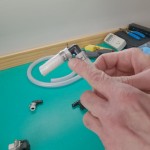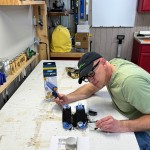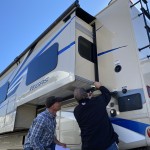This post may contain affiliate links.
What do I do for fun when I’m on an organized RV caravan trip? I wake people up early in the morning when it’s quiet so we can test the noise levels coming out of their generators! Seriously. Check out the video!
So, in a very rural and quiet setting, I realized I had Gasoline, Propane, and Diesel powered generators all in the same vicinity, mounted in motorhomes. I pulled all three of these into the same spot on the road, and had them fire up their generators while I measured things with a sound level meter and a tape measure. My goal with this was to see if each of the generators – as mounted by Winnebago in these coaches – passed the National Park Service generator standard of 60 decibels (A weighted) at a distance of 50 feet. That number is derived from the Code of Federal Regulations, 36 CFR Section 2.12 which prohibits:
Now, I don’t know if I’m a “reasonably prudent person”, but I can at least read a sound level meter.
The Results
The good news is that ALL OF THEM PASSED. But there were some interesting observations to be made along the way. First, here are the results in tabular form:
| 2 feet | 10 feet | 25 feet | 50 feet | |
|---|---|---|---|---|
| 2800 Watt Gasoline Generator | 86 dB | 76 dB | 65 dB | 60 dB |
| 2500 Watt Propane Generator | 87 dB | 75 dB | 65 dB | 60 dB |
| 3200 Watt Diesel Generator | 80 dB | 69 dB | 61 dB | 57 dB |
So probably the most interesting thing to me was that the largest generator was also the quietest. The 3200 watt diesel generator bested its gas and propane brethren at all distances. I can think of three possible explanations for this:
- The diesel generator was mounted behind a door, whereas the gas and propane generators were suspended from above. The door and compartment mounting helped deaden the sound.
- The diesel was the physically largest and heaviest of the generators. Just like in my shop tools, more mass means less vibration and consequently, less noise.
- The sound frequencies produced by the diesel generator are lower, and those are represented less in an A-Weighted decibel measurement.
In any case, the diesel generator was certainly the most pleasant of the three to be near.
The other interesting observation was that the gasoline and propane generators were basically equivalent in noise output, with the propane generator perhaps slightly louder at close ranges. This was not what I expected – I expected the gasoline generator to be the loudest by a clear margin. I don’t have a good answer for this one, but I’m pretty happy about it – since we have a gasoline generator in our new coach!
So, while this may not have been the most controlled experiment I’ve ever run, I think it was worth doing. The combination of these Cummins-Onan generators, and the way that Winnebago had them mounted in the Travato and Navion coaches, proved enough to meet the standards for running generators in our National Parks. (During permitted hours, of course!) Please use them responsibly.
Cheers!











Hello.
I couldn’t read all these replies (popular issue it seems) to see if anyone else pointed out what a “rocket scientist” should know: a diesel engine “fires” in an entirely different manner from a gasoline engine hence the different “sound signature”.
Propane and gasoline engines are both fired by a spark plug and therefore have the same sound signature.
Rudolph Diesel invented his engine in about 1910. You can read about it as well as a patent dispute with a similar “glow plug” compression engine.
Beyond that you are comparing apples and oranges which is a dicey game from which to attempt valid conclusions.
But thanks for your earnest effort.
“Spencer” – nobody else made a similar comment, mostly because everyone else seemed to get it.
In the post (that you admit you did not thoroughly read) I state “My goal with this was to see if each of the generators – as mounted by Winnebago in these coaches – passed the National Park Service generator standard of 60 decibels (A weighted) at a distance of 50 feet.”
If you feel that valid conclusions cannot be drawn from the evidence presented, please explain. Better yet, repeat the experiment, make your own video.
Now, had I titled the post “An Investigation Into the Reasons Behind Tonal Differences Between Gas, Propane, and Diesel Generators as Mounted in Winnebago Compact Coaches”, and with that title had I still neglected to mention the difference in combustion cycles – you might have a point.
But that was not the goal of the exercise – as indicated by the part where I said “My goal was…”
Great reply to Spencer. We own. Winnie Fuse with a 2500 Onan LP. I did the same test, and got the same result as you on my Onan. It sure is noisey at the source, but at 50 feet pretty tame. We use a muffler and it helps knock out the high frequencies but not an overall reduction in volume.
Thanks for that info. We have the diesel and I was wondering if it was as loud as other fueled gens. I don’t think there is a solution to the injector hammering.
Ballard insulation in Seattle has been helping with noise issues in the marine industry for years . They will custom make blanket insulation panels, covers etc. They are very helpful. If you send them a detailed drawing they will set you up with a perfect fit. Not cheap but well worth it.
Why are we not deploying built in quite Honda or Yamaha generators for 2500 watts?
Most of them (as far as I know) do not make a generator that meant to be permanently mounted in a moving RV.
what type gererator setup is roadtrek useing and how good does it work?
I don’t know if Roadtrek is still using a traditional generator similar to the ones tested here.
If they were using a generator like these, it would most likely be a Cummins/Onan – similar to these. And it would work about the same.
Hi James
I understand you removed your gen from Lance is that correct? Do you have a picture of the bracket WGO used to mount your gen? I have a Trend and the gen is in the same area, I would like to move it forward between the axles. Since my frame is extended, the bracket should be different from yours.
Mine was extremely noisy and I found that when installed the clearance between the exhaust pipe and the mounting bracket was too close. When the gen was running the pipe was banging on the bracket which made the gen sound much louder than it was. I took the bracket off and cut it to allow more clearance, much quieter now.
It’s true, we removed the generator from Lance. I didn’t take any pictures of the bracket, nor did we save it. We recycled it.
It was mounted from above with four bolts through the floor of the rig. The bracket captured the sides of the generator near the bottom. Is that how yours mounts? Ours was nowhere near the exhaust.
I enjoyed this information very much. Our 4KW onan always seems too loud to me, and have often wondered about the use of a genturi and/or those Onan resonators in terms of what the real effect in noise reduction is.
I think that would be an interesting follow up test!
Anyway, thanks… I enjoy your videos!
I actually have it in mind to make just that video. (Can’t promise you a date yet though…)
would like the manufacture name of the propane generator that you tested in the motorhome. Thanks, I have a propane onan in my cabover (truck camper) and it is quite load.
Hi Mark – the propane generator was actually an Onan!!
It was the 2500 Watt QG LP.
It’s probably the same one you have – though perhaps newer.
In a truck camper, I would consider dumping the attached generator and going with a pure portable model. I will have a video up tonight that shows a generator I could recommend.
Hey guys!
Have you considered a resonator / muffler for the generator pipe like this?
https://www.youtube.com/watch?v=gQboSPqKtfE
Looking forward to seeing what you found at the Outdoor Retailer Summer Market.
Best,
Alex
I’ve considered that, and I had installed one of those on Das Bus. It helps, but it’s no miracle.
I will probably wind up installing one of those just because it’s supported by Onan, it’s cheap, and it helps somewhat.
For this test though, none of the coaches had one installed.
Winnebago should look into an underhood generator. Much quieter and reliable as you are using the vehicles engine to power the generator.
I’ve actually spoken with them about that. It turns out that there are warranty issues with the chassis manufacturers if they add a second alternator and encourage people to idle extensively. I’m not saying it will never happen, but I do suspect they’d have some things to work out with Mercedes and/or Fiat/Chrysler before that could happen. I’ve got another generator option I’ll be posting within the week that will blow minds though.
Hi James,
Isn’t engineering fun!
Many years ago, I worked as a field engineer for a Danish company, Bruel & Kjaer instruments. At the time, and still today, they are the premier manufacturer of all things acoustic measuring in nature. Precision microphones, mike amplifiers, acoustic analyzers and yes, sound level meters. (and many other things too!)That was a long time ago, but I did manage to learn a lot about acoustic measurements.
The measurements you made are the measurements you made. I’d like to suggest the next time that you hold the SLM out at arms length from your body and keep it at the same position and angle measurement to measurement. Your body can act as a reflector at certain frequencies and combined with height and angle variations, can change the results significantly.
You DO want to continue to use “A” weighting, since it is part of the requirement and it actually was designed to simulate the response of the human ear at the levels you were measuring. Fast or slow is up to you (mostly) but I’d suggest that since the noise from the generator is fairly constant, “slow” may yield more consistent results.
I thought I saw some variations in what you pointed the SLM “at” during the measurements. In one segment, it seemed like you were a couple of feet beyond the end of the coach, at an angle to the vehicle and not square to it. That variation can cause differences in readings and should be minimized.
As far as the differences in sound level from the various fuel types goes, the gas and propane gennys are nearly identical in construction, so I would fully expect the sound level to be the same.
The diesel machine is heavier, with more mass in the engine and may run at 1800 rpm Vs, 3600 for the gas and propane machines and so as you suggested, has a lower note and is a significantly quieter (3dB less=half as loud).
.Another poster’s comments about the surface is right on. Grass and dirt, dirt and forest duff, both will be much more absorbent than concrete or pavement. Trees, bushes, variations in the terrain, wind, temperature and humidity will all make things sound “quieter” to the meter, so if it gets down to “are you too loud” and a measurement is made, it can be a bit of a crap shoot.
Besides the carpet trick, the extended air-cooled exhaust tubes that are sold to make the exhaust exit at a place above the couch can help, as can a simple elbow pointing to the rear of the coach. For those more adventurous, wrapping the exhaust pipe with high temp material (often seen on motorcycles and hot rods) can help with sound coming from the sides of the pipe. Anyone into car stereo or marine engine installations can help further with products designed to absorb sound in those environments-if the temp range is right, they can do wonders for panel vibration issues.
Finally, the coach manufacturers only effect the sound being generated by continuing to purchase the generators that they do and mounting them the way they do. The generator manufacturer knows what they can do to make the machine pass the requirement and so, that is all they do. They could design small, quiet machines but the cost and weight would be much higher than the market would likely accept.
If anyone is really interested in the art and practice of sound measurement, go to the Bruel & Kjaer website, poke around and find their handbook on sound level measurements. It’s a great piece and easy to read and understand. The ideas and principles are based on timeless science and engineering and a pleasure to understand.
Keep up the great work and enjoy your coach!
Here here Tom! Good observations all!
What you’re seeing in the video is partially an artifact of how we were filming. We were just using the one camera. When you heard me call out the numbers, those were real. But then we had to take a second B-roll shot for a closeup of the meter. When we gathered a second person around the meter, the reading would sometimes change, and sometimes there would be a glare on the meter, and we would have to tilt it, etc. In short, we did the best we could. I didn’t think of it until later, but the meter had a tripod mount on it – and we had a tripod available. That probably would have helped.
But overall, I don’t think those slight errors in my measuring would have affected the overall outcome of the test. The diesel would still have been the quietest, for the reasons both you and I pointed out. Gas and propane would have still been roughly equivalent, and would have squeaked in under the wire on the 50 foot test.
I do think you’re right about the slow pace of innovation in the RV generator market. But I saw a generator this week at the Outdoor Retailer Summer Market that will blow minds with its silence!
Like – HALF as loud as the Honda…
And I’m wondering if I can retrofit it onto my RV…
People will freak.
Seriously. I’ll have the video up this week.
so, I look forward to the generator clip!
Two things come to (possible) mind: Fuel Cells and Stirling engine powered generators. A couple companies have dabbled in Fuel Cells for RVs and there is a German company right now that makes a couple of varieties running on Methanol. On the Stirling engine side, a Dutch company active in yacht power systems made such a generator a few years ago powered by diesel. It was almost totally silent, generated DC power 24/7 and produced, if I recall, water vapor, few emissions and warm water as the byproducts of producing 18 kilowatt-hours a day of clean DC power.
SO, I am very curious to see what you found!
Cheers!
Well, it’s going to be something much more conventional – and just a lot more quiet.
On the Stirling gen, I think you’re talking about the Victron WhisperGen – which seems like it was available for a time, and now isn’t.
I’ve done similar testing. What makes a huge difference is the surface you are parked over. Doing the test over asphalt is giving you a much higher result. If you had tested parked on the grass would have made a huge difference.
Some folk recommend carrying a carpet square to place on the ground underneath the exhaust outlet to use to knock the sound down.
Absolutely! A hard, acoustically reflective surface is going to be the worst-case situation. (That’s why I had everyone move out to the pavement.)
In addition to the direct noise from the generator, you’ll also get the reflected noise. So it will be louder.
Softening the surface is certainly going to help.
Back when I would take on sound engineer gigs, some clubs would “get it”, and they’d have heavy drapes over the brick walls. Some clubs refused to catch on, and they always sounded the worse for it.
The carpet square is the RVer’s equivalent to those heavy drapes. They help keep as much sound from reflecting.
But knowing that my generator passes without the carpet square, I doubt I’ll start carrying one. I can’t spare the space!
I would have liked to see the performance results of the Onan 3600w LP generator used in Views/Navions and Reyos/Vias. That would have completed the full line-up of generators used in these small coaches. Did you by chance test one?
Didn’t test one. I was more concerned with getting all three fuel types tested. We had a couple more Views/Vias around, but I didn’t think to check their generators or test them. Sorry!
I was hoping you were withholding info…LOL. Thanks and good work. This post is an example of things most of us never think. Thanks.
Doing a generator test with no load and saying it is quiet is like saying your holding tanks are of “unlimited” capacity. Only true if you never use them.
Well, it wasn’t technically no load. We had all been dry camping all night with no generators, so there was at least some battery charging going on.
And I actually did have all the coaches kick on the air conditioning. I have the footage of that at the 50 feet, but didn’t include it for a few reasons.
The main reason was it didn’t sound any different to the ear. It only increased the noise level (as measured) 1 – 2dB on the Travato coaches, and 1dB on the Navion. But then, the Navion had a different air conditioning unit than the Travatos, and it was unclear if the noise was because of the air conditioning unit itself or the generator. But either way, it didn’t change things much at 50 feet.
Second reason is, if anyone comes complaining about your noise level, I think most of us would kill the AC while we were being measured.
So I do have the data. But it doesn’t sound different to the ear, you can only tell it’s different if you have measuring equipment, it would have made the video two minutes longer, and then I’m sure someone would have pointed out the different AC units on the coaches.
So the real story is, not too different with the AC on, but to be safe, turn the AC off if a ranger comes around checking!
Great video James! First time I’ve seen something like that. Very informative. If you can find one someday, it would be interesting to get readings from the new Roadtrek under hood diesel generator that works as a regular generator and as a booster for their new lithium battery systems.
Yeah, Roadtrek and Advanced-RV use the second alternator approach.
I’m sure it raises the noise level somewhat, but the Mercedes diesel is – at nearly any level of load – going to be quieter than an external generator.
Next time I’m around one of those though, I may pull out the meter.
James, Thanks for the review. Very helpful. What about the noise level inside the RV and under the awning on the passenger side. Are you bothered by the noise inside Lance and under the awning? What’s your personal experience? I am seriously considering a Travato 59K with the gas engine and gas gen option. I like your videos a lot.
Stanley
We didn’t test the noise level inside the RVs, though that’s a good idea.
Honestly, I felt like it was imposing enough to ask everyone to move their coach and run their generators on my command. “Can you please pick up your dirty laundry so I can film in here?” was someplace I didn’t want to go. To make a better test, I’d probably need to do that on empty, un-personalized rigs. Maybe at a dealership or something?
Anyway, generally speaking, it’s always louder outside. Speaking about our rig, our concern with generator noise isn’t for ourselves, but for the folks around us. We usually only run it if we need to run the AC, and we’re inside if that’s going on. I’ve been able to nap in ours with the generator running.
We didn’t test the awning side noise for two reasons: First, I didn’t think of it; and second, we would have to have deployed the awnings into the street. It wasn’t a busy road at all, but still…
Honestly, that’s about what I’d expect.
As much as I’d love to see quieter solutions, minimum adherence to NPS requirements is all that is needed to make a coach commercially viable. Always count on corporate bean counters to ensure that “just enough” effort goes into build quality, so that profits are maximized. You can’t sell a rig that makes all the park rangers beat on your door every time you fire up the genny. A loud genset is just a recall waiting to happen.
Of course, sometimes there are exceptions to this, but it’s a general rule of thumb that can be counted on more often than not.
Well, I don’t know that I’d go blaming the coach manufacturers. It’s not like they are deliberately trying to *amplify* the noise the generator makes.
If there was a quieter option, with equal reliability, I’m sure they’d look at it. But it couldn’t be so expensive that nobody would buy the coach, either.
Interestingly, I saw an extremely quiet generator just today. A Generac IQ. Much quieter than the similar sized Honda. I asked if they had any plans to make them RV-mountable, and of course, they said, “no, not yet.” I’m hoping they change their mind on that. It was a really quiet generator. I think I’ll go back and make a video of it.